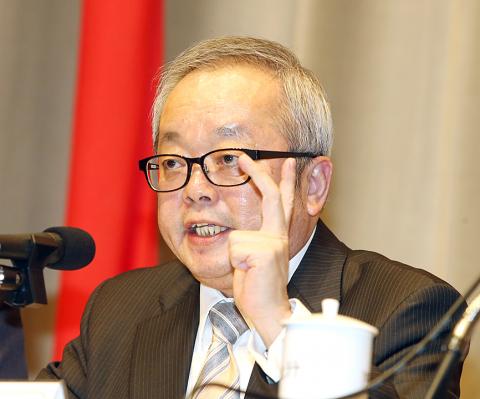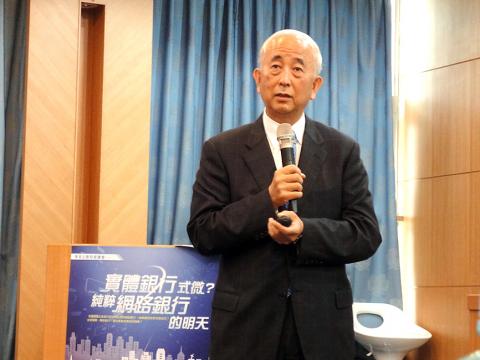State-run banks could lose up to NT$20.1 billion (US$665.97 million) for extending a loan to troubled Ching Fu Shipbuilding Co (慶富造船), the Cabinet said yesterday, adding that First Commercial Bank chairman Tsai Ching-nain (蔡慶年), who supervised the syndicated loan, would be removed.
However, there is no conclusive evidence of any political intervention in the loan decision, the Cabinet said.
Ching Fu, which was awarded a NT$35.8 billion contract to build six minesweepers for the navy as part of a domestic warship program, defaulted on a NT$20.5 billion syndicated loan, forcing nine banks to lose a combined NT$20.1 billion, an Executive Yuan report said yesterday.

Photo: CNA
The investigation revealed major dereliction of duty by the Ministry of National Defense and First Bank in awarding the contract and loan to the financially unstable company, Vice Premier Shih Jun-ji (施俊吉) said.
There were also suspicious money transfers to Ching Fu, and questionable communications between the Presidential Office and the Cabinet over the case, Shih added.
The ministry failed to ensure that Ching Fu had the financial capability to carry out the project; failed to ensure the company had the manufacturing ability; and failed to launch a negotiation process with China Fu and a potentially more qualified bidder, CSBC Corp (台船), before resorting to lots-drawing to decide the winner of the minesweeper tender, the report said.

Photo: Lu Kuan-cheng, Taipei Times
The ministry lowered the minimum asset requirement for potential bidders from NT$3.52 billion to NT$176.46 million, Minister without Portfolio Lo Ping-cheng (羅秉成) said.
It also neglected that Ching Fu had little ability to construct a shipyard for the minesweepers and awarded the project anyway, Lo said.
“Throughout the whole procurement process, the ministry gave the impression that it was biased toward Ching Fu and relaxed the rules,” Lo said.
According to the report, First Bank was also negligent in failing to ensure that Ching Fu had the financial and manufacturing ability before approving the loan.
While it required Ching Fu to complete a capital increase as part of its loan terms, the bank failed to demand an execution plan in advance, resulting in the bank’s approving an additional loan of NT$1.05 billion to help Ching Fu increase its capital.
“The bank opened its vault for Ching Fu to take the money away,” Shih said.
Tsai is to be removed due to negligence and the ministry has to report its planned disciplinary measures to the Executive Yuan, Shih said.
Meanwhile, Ching Fu transferred NT$4.93 billion of the loan money into five questionable accounts in Hong Kong, Macau and Singapore, which the company said were used to pay ship manufacturing costs, Shih said.
About NT$1.3 billion was transferred back from the overseas accounts to those of Ching Fu’s managers and subsidiaries in Taiwan, Shih said, adding that prosecutors are to investigate suspected money laundering or other illegal activities.
The Presidential Office on Sept. 1, 2015, under then-president Ma Ying-jeou (馬英九), issued a document to the Executive Yuan which included a letter by Ching Fu petitioning the government to assist the company in securing loans, the report said.
Former Executive Yuan secretary-general Chien Tai-lang (簡太郎) then convened two meetings with the banks to discuss the loan case in September and December that year, but Tsai said he was not under pressure to have First Bank lead the loan, Shih said.
“Although the investigation reveals [the actions of the Presidential Office and the Executive Yuan], it does not mean that we have determined there was interference by senior officials,” Shih said.
The Cabinet began the investigation on Oct. 17 and is to transfer the case to the judiciary for further investigation.
Meanwhile, President Tsai Ing-wen (蔡英文) yesterday said in the Solomon Islands that whether the government should transfer the minesweeper project to another shipbuilder or abort the project to upgrade the existing fleet depends on the navy’s evaluation.
“It has to be a professional decision rather than a political one,” she said.
Additional reporting by Chung Li-hua

SECURITY: As China is ‘reshaping’ Hong Kong’s population, Taiwan must raise the eligibility threshold for applications from Hong Kongers, Chiu Chui-cheng said When Hong Kong and Macau citizens apply for residency in Taiwan, it would be under a new category that includes a “national security observation period,” Mainland Affairs Council (MAC) Minister Chiu Chui-cheng (邱垂正) said yesterday. President William Lai (賴清德) on March 13 announced 17 strategies to counter China’s aggression toward Taiwan, including incorporating national security considerations into the review process for residency applications from Hong Kong and Macau citizens. The situation in Hong Kong is constantly changing, Chiu said to media yesterday on the sidelines of the Taipei Technology Run hosted by the Taipei Neihu Technology Park Development Association. With

CARROT AND STICK: While unrelenting in its military threats, China attracted nearly 40,000 Taiwanese to over 400 business events last year Nearly 40,000 Taiwanese last year joined industry events in China, such as conferences and trade fairs, supported by the Chinese government, a study showed yesterday, as Beijing ramps up a charm offensive toward Taipei alongside military pressure. China has long taken a carrot-and-stick approach to Taiwan, threatening it with the prospect of military action while reaching out to those it believes are amenable to Beijing’s point of view. Taiwanese security officials are wary of what they see as Beijing’s influence campaigns to sway public opinion after Taipei and Beijing gradually resumed travel links halted by the COVID-19 pandemic, but the scale of

A US Marine Corps regiment equipped with Naval Strike Missiles (NSM) is set to participate in the upcoming Balikatan 25 exercise in the Luzon Strait, marking the system’s first-ever deployment in the Philippines. US and Philippine officials have separately confirmed that the Navy Marine Expeditionary Ship Interdiction System (NMESIS) — the mobile launch platform for the Naval Strike Missile — would take part in the joint exercise. The missiles are being deployed to “a strategic first island chain chokepoint” in the waters between Taiwan proper and the Philippines, US-based Naval News reported. “The Luzon Strait and Bashi Channel represent a critical access

Pope Francis is be laid to rest on Saturday after lying in state for three days in St Peter’s Basilica, where the faithful are expected to flock to pay their respects to history’s first Latin American pontiff. The cardinals met yesterday in the Vatican’s synod hall to chart the next steps before a conclave begins to choose Francis’ successor, as condolences poured in from around the world. According to current norms, the conclave must begin between May 5 and 10. The cardinals set the funeral for Saturday at 10am in St Peter’s Square, to be celebrated by the dean of the College